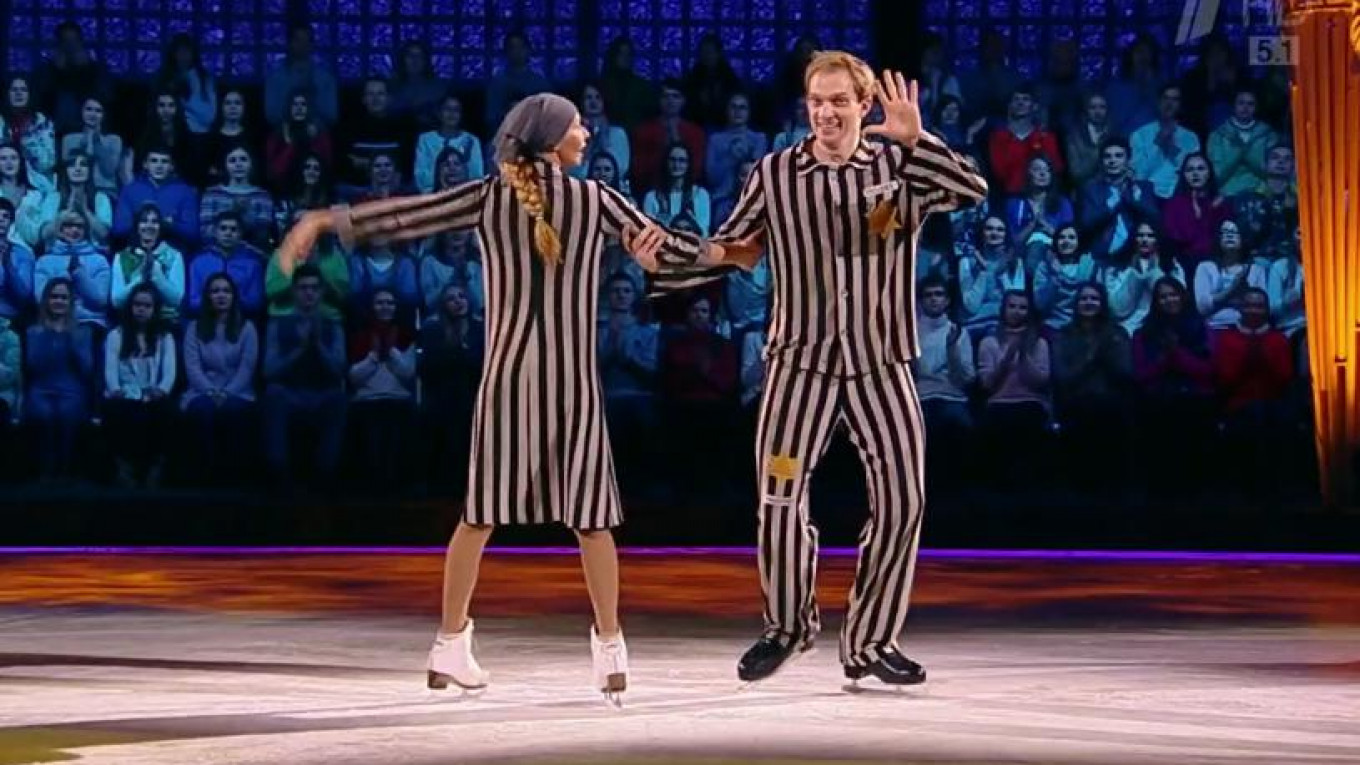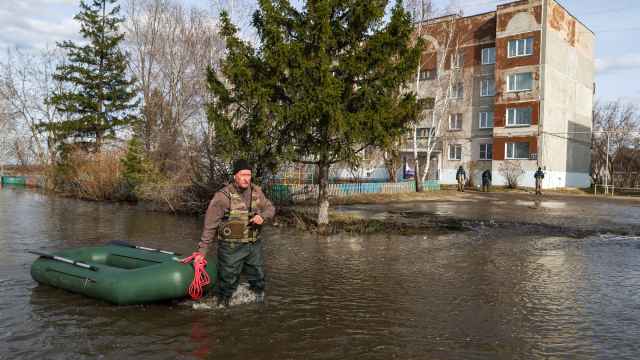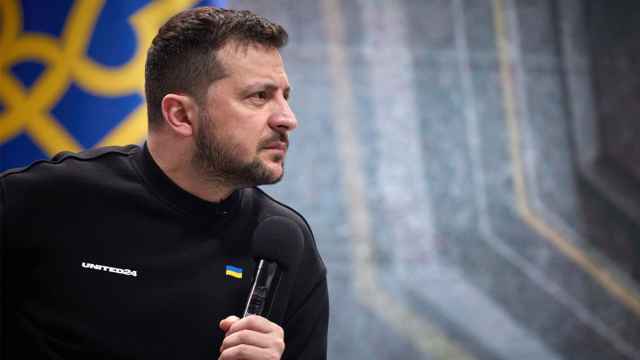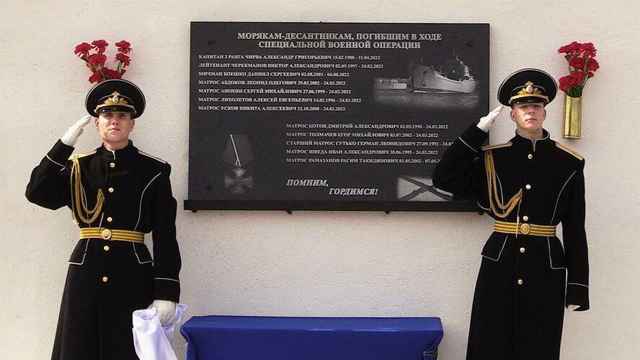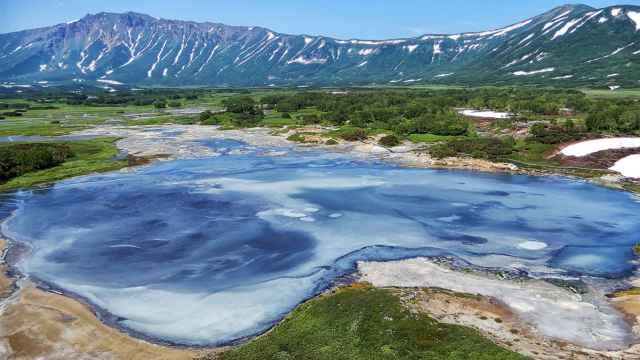“This is all very weird to me,” Tatiana Navka, an ice-skating celebrity, told The Moscow Times on Monday. “Our show, ‘Ice Age,’ has been on air for ten years now, and several years ago I performed a routine based on [the 1993 film] Schindler's List. I was wearing a prison uniform then, as well, and no one seemed to notice,” Navka said.
What Navka couldn’t wrap her head around was the enormous, now international backlash in response to her most recent performance. This Sunday, the state-funded Channel One television network aired footage of Navka skating with TV actor Andrei Burkovsky. (Watch it here on YouTube.) For the routine, the two wore striped uniforms with yellow patches in the shape of the Star of David. The performance was meant to be an homage to “La Vita è Bella” (Life Is Beautiful), Roberto Benigni’s 1997 film about the Holocaust.
Between pirouettes and dance elements, Navka and Burkovsky smiled to their imaginary child and pantomimed shooting at each other. The performance ended with Burkovsky’s character dying from a gunshot.
The Backlash
By noon on Monday, the dance was ripped to pieces and condemned first by Russians on social media, and then globally by journalists and pundits abroad. The most charitable interpretation of the performance, critics argue, is that it was a mockery of the Holocaust. At worst, they say, it was an anti-Semitic prank.
“It is scary to watch it. The country is f**ked up,” wrote Rustem Adagamov, a prominent photographer and blogger. Others confronted Navka on her Instagram account, writing things like “You should apologize! My all family was murdered at Babi Yar. What kind of sicko are you?” Another person wrote sarcastically, “We’re in a concentration camp. We’re Jews. We’re having fun. Life is beautiful!”
Of course, not everyone thinks the ice-skating performance was a travesty. Radio and television host Mikhail Kozyrev says he doesn’t believe the dance mocked anyone, and TV critic Arina Borodina argues that the show was actually a public service. “When five of ten [viewers] are actually finding out that there was this film, that it addressed this subject, and that there was this tragedy, the Holocaust, then this isn’t some insignificant thing we’re talking about,” she explained on Facebook. “Ice Age” is critically acclaimed and one of Russia’s most-watched prime-time shows.
These apparent saving graces were largely, if not completely, lost on audiences in Britain and the United States.
“It’s a ‘Beautiful’ disgrace,” wrote The Daily News. “There’s no easy way to say this, but here’s a pair of Russian ice skaters performing a Holocaust-themed routine for a TV show,” Buzzfeed warned its readers. “Russian Holocaust ice-skating routine slammed as ‘unbelievably tasteless,’” read a headline on CNN’s website.
“Oh those whacky Holocaust victims (OH MY GOD OH MY GOD OH MY GOD),” tweeted Jewish-American comedian Sarah Silverman.
‘It Had a Lot of Soul In It’
Tatiana Navka told The Moscow Times that she is shocked by the backlash, insisting that her dance demonstrated nothing but empathy and compassion for Holocaust victims.
“What we did was beautiful, it had a lot of soul in it,” she said. “We showed that people during those horrible times lived and loved until the very end. It should have inspired different emotions and desires in people — not what elicited these silly comments.”
Ilya Averbukh, the show’s producer, echoed Navka’s sentiments in comments to The Moscow Times. Averbukh produces “Ice Age” and coached Navka and Burkovsky. Also a prominent Russian ice skater, Averbukh said, “The show [this week] was devoted to great Western films. Each [ice-skating] couple chose a theme from a film. Tanya, Andrei, and I chose to base our performance on Life Is Beautiful, a great film, in order to remind people about this terrible tragedy that happened to humanity.”
Navka says she suspects that her new marital status is what pushed her into the spotlight that now shines so unflatteringly on her latest performance. Last year, she married Dmitry Peskov, Vladimir Putin’s long-time official spokesman. “Maybe, my status has changed, and [people believe] that there are things I can and cannot do. But who decides that?” she asked.
In Roberto Benigni’s film, a father and a son are sent to a concentration camp. To spare his young son the trauma of imprisonment, the father pretends that it is part of an elaborate game. “This is exactly why we have these smiles in the performance — they’re smiles on the verge of tragedy,” Averbukh said. “I think that it was done very tactfully, in line with the film, and if you’re not educated enough to have seen the film, watch it first, and then talk [about the performance].”
Offended Feelings
Should there be a performance like this, with smiles and pantomimes, devoted to the Holocaust? Yes, argues Alla Gerber, the founder of Moscow’s Holocaust Center Foundation. “The Holocaust is not just about the victims — it is of course first and foremost about the victims, but it is also about their spiritual resistance,” she explained to The Moscow Times. “We should be thankful for anything being made about resistance during the Holocaust and about spirit, whether it’s a book, a film, a dance, or whatever.”
The Italian film Life Is Beautiful won three Oscars, after its release in 1997. “Still,” Gerber remembers, “a lot of people slammed it back then, too.” Some critics thought the film treated the Holocaust too lightly.
In some ways, the backlash against Navka’s ice-skating performance resembles the Kremlin’s ongoing moral campaign to protect the public from supposed offenses to “religious sensibilities.”
“I know some crazy people attacked Jesus Christ Superstar recently, on the grounds that it offends Christianity,” Gerber says. “This is total crap, as well.”


